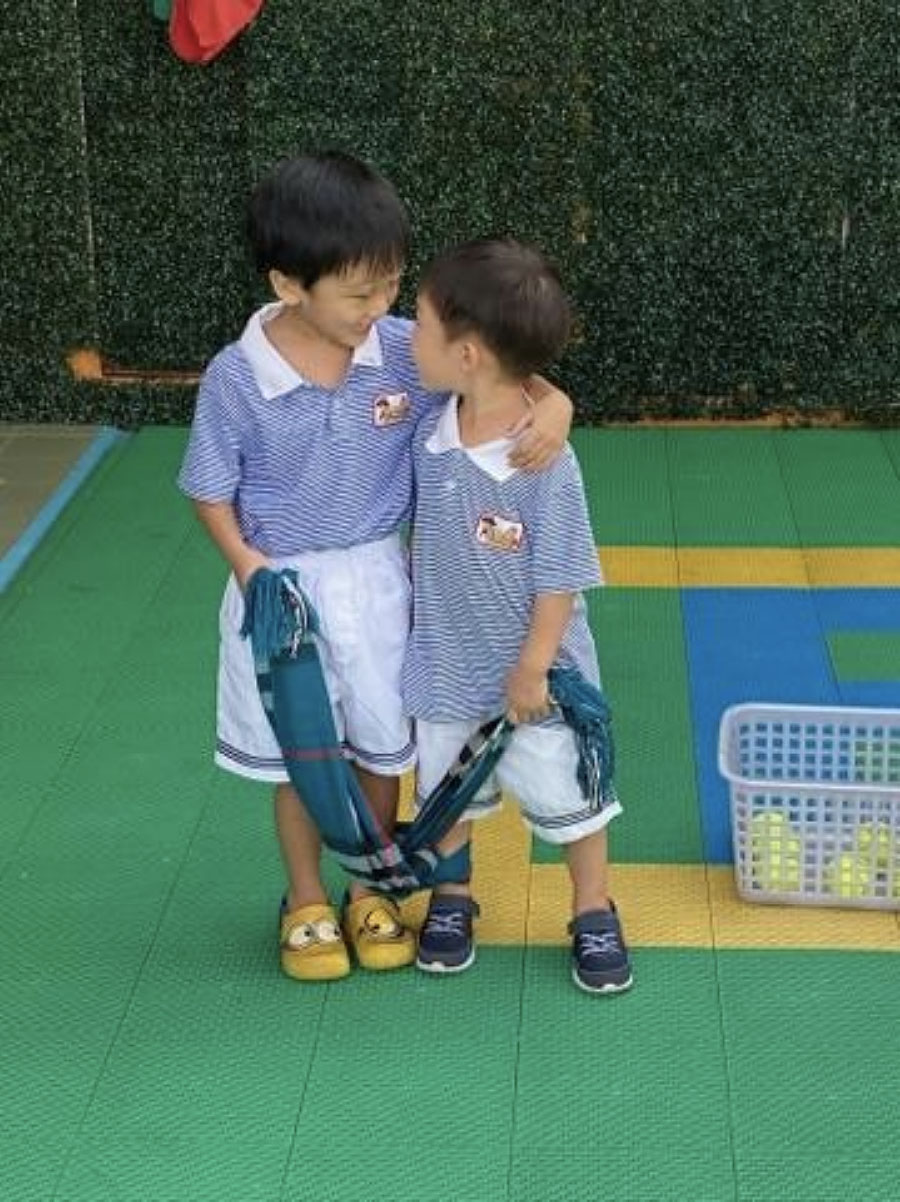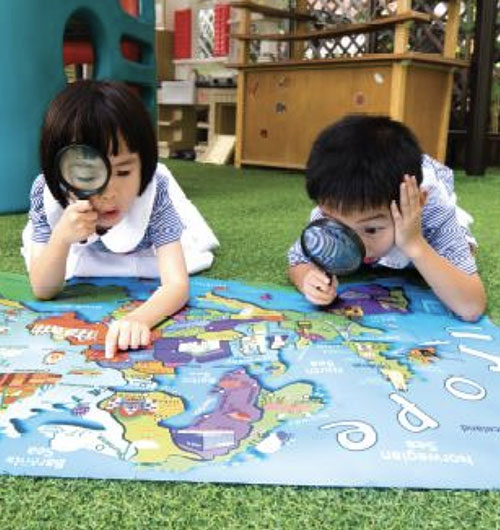Raising a Globally Competitive Child with a Positive Mindset – Part 2
This is part 2 of a multi-series article about how to raise a globally competitive child with a positive mindset. While many preschools mainly focus on preparing children to be Primary 1 ready, Little Sage goes far beyond that. We prepare our children for life. We educate preschoolers that “life is not about how many times you fall, but how many times you get back up.“ That journey begins with instilling preschoolers with the ability to overcome and embrace discomfort. This is one of the attributes necessary to becoming globally competitive and living a fulfilling life.
What is discomfort?
Discomfort is a broad term. Things such as unfamiliarity, differences, obstacles, unpleasantness, awkwardness, problems, risk and pain make us uncomfortable. Basically it is everything we humans are innately programmed to shun and dislike because it arouses a “fight-or-flight” response. And for exactly that reason, one who can embrace discomfort is more likely to succeed as many human beings naturally lack this attribute. As parents, we raise our children hoping they can live comfortable lives. How do we actually achieve this? We as parents do not want our children to fall or fail because it is unpleasant for them. We want to solve problems for our little ones so they do not have to be stressed. What is the true purpose of bringing our children to this world and giving them an education? Does a pilot undergo numerous hours of training so he can learn to fly in smooth weather and relax? No. The training is to deliberately challenge him so he can be acclimatized to flying through inclement weather or anticipate the unexpected because his duty is to make an unpleasant situation comfortable enough for himself and those around him. He combines his knowledge, emotional intelligence and experience from hours of rigorous training and practising to solve problems and overcome discomfort so he can make himself, his cabin crew and his passengers at ease.
Parents need to believe that for their children to be comfortable long term, they must first learn to embrace discomfort starting preschool years. While embracing discomfort is necessary to succeed in life, many schools do not teach that. The educational philosophy of Little Sage is about equipping our children with the ability to embrace and overcome discomfort. It is about confronting problems and resolving them rather than eschewing them. People who are globally competitive will have an even greater prowess because they will need to solve issues that are more convoluted and unpleasant. This is why people who are globally competitive are usually more sought after anywhere they go in the world.
How do we teach children to embrace discomfort?
 First, expose them to things that are unfamiliar to them. What is familiarity? It is merely something unfamiliar that is being exposed repeatedly for one to become familiar. Humans shun differences because humans have a natural predisposition toward things they can relate to and are familiar with. The human brain has already formed bonds with something of which it has prior knowledge. This is why humans like to make friends with people who share common interests, language and background. Something that is different is generally unfamiliar to us. Thus it makes us uncomfortable because it is more difficult for our brain to connect with it. But what if we are able to train our children to perceive something different and unfamiliar to be intriguing? That would inspire our children to want to learn more about it and be more willing to embrace it.
First, expose them to things that are unfamiliar to them. What is familiarity? It is merely something unfamiliar that is being exposed repeatedly for one to become familiar. Humans shun differences because humans have a natural predisposition toward things they can relate to and are familiar with. The human brain has already formed bonds with something of which it has prior knowledge. This is why humans like to make friends with people who share common interests, language and background. Something that is different is generally unfamiliar to us. Thus it makes us uncomfortable because it is more difficult for our brain to connect with it. But what if we are able to train our children to perceive something different and unfamiliar to be intriguing? That would inspire our children to want to learn more about it and be more willing to embrace it.
I cannot emphasize enough the importance of history in helping children grasp differences and unfamiliarity. History helps humans connect the dots through time. It helps us comprehend cause and effect. The reason you and I are different is merely because we took off from a different starting line. Or even if we started at the same place, we are vastly different today because we took diverging paths. One activity parents can easily conduct is to share with their children family history. Children can better understand why they are the way they are today and why they are different from the neighbor next door or the friends at school. If possible, having grandparents narrate family history to grandchildren is one of the most valuable experiences that young children cherish.
Secondly, parents need to open up their children’s minds to the world early. The fact is the world is large and inundated with heterogeneity. Therefore, encountering something unfamiliar should be the norm. And if our children can accept that fact, they will be more intrigued by differences and unfamiliarity rather than to avert them. Tell your children about recent events around the world. Tell them about the koalas that lost their homes in a country called Australia because of wildfires. Wildfires are bad for the environment. Parents often ask me, “Isn’t that too early? My child won’t know where Australia is.” I tell parents that every story has a setting. Stories can take place “once upon a time, in a castle far far away…” It just happens the setting to our non-fiction story is an actual place called Australia. Next time when your child learns about kangaroos, he will recall the story of koalas and be able to put Australia in a better context.
It is essential your child recognizes she is unique
Once the above is achieved, your child will be better at embracing and appreciating the fact that she is different. In fact, she will be proud of being unique. It will not be an issue to be that odd person in raising her hand to express her opinion when everyone else prefers to follow the crowd and remain silent. While most run away from something they are unfamiliar with, your child will be more equipped to learn about the new opportunity because she finds it to be fascinating. That is why she will have a higher chance of excelling than others because she will be present to capitalize on opportunities when others are nowhere near them. She recognizes that the world should be filled with unfamiliarity and differences. Learning about them so she becomes familiar and comfortable with them is the reason why she is excited about waking up every day.
 At Little Sage, we have ample activities to help young children get out of their comfort zone as part of the life-long learning process. Aside from our unique teaching method that adopts the best elements from around the world, our global immersion program is designed to open up our children’s minds to the differences around the world. Even at such a young age, our students are fascinated by diversity and that they are enthused to learn about the world outside of Singapore. They want to seek unfamiliarity. In addition, Sage Sports is specifically designed to allow children to embrace discomfort without their even being aware of it. Over time, they will get accustomed to unpleasantness and be comfortable with them. We will then increase the level of difficulty and extend our children’s limits so they become uncomfortable again. Some of the activities require them to start in awkward positions. However, it is up to them and their team members to creatively come p with ways to make themselves comfortable while completing a task. While they are all safe and fun, some of the activities are designed to let children fail in a controlled manner so they can get back up n their own or as a team. Therefore, after repeated attempts, they will realize that failing is natural nd getting up is just an instinct. A lot of these exercises are used by professional athletes and multinational corporations to nourish next-generation leaders.
At Little Sage, we have ample activities to help young children get out of their comfort zone as part of the life-long learning process. Aside from our unique teaching method that adopts the best elements from around the world, our global immersion program is designed to open up our children’s minds to the differences around the world. Even at such a young age, our students are fascinated by diversity and that they are enthused to learn about the world outside of Singapore. They want to seek unfamiliarity. In addition, Sage Sports is specifically designed to allow children to embrace discomfort without their even being aware of it. Over time, they will get accustomed to unpleasantness and be comfortable with them. We will then increase the level of difficulty and extend our children’s limits so they become uncomfortable again. Some of the activities require them to start in awkward positions. However, it is up to them and their team members to creatively come p with ways to make themselves comfortable while completing a task. While they are all safe and fun, some of the activities are designed to let children fail in a controlled manner so they can get back up n their own or as a team. Therefore, after repeated attempts, they will realize that failing is natural nd getting up is just an instinct. A lot of these exercises are used by professional athletes and multinational corporations to nourish next-generation leaders.
As I mentioned in the previous article, we as parents all have a qual chance of raising a child to be globally competitive who live fulfilling lives. The key is whether we as parents choose to protect our children so they do not fall and let them be comfortable all the time, or let them fail in a safe environment and be unpleasant so they can bounce right back up.
Stay tuned for subsequent articles! For more information and a tour, please visit https://littlesagepreschool.com.sg/






Give your Opinions